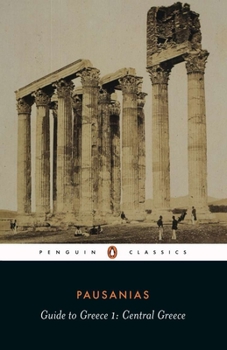Guide to Greece: Central Greece (Guide to Greece, 1 of 2) (book 1, 2, 7, 9, 10)
Select Format
Select Condition 
Book Overview
The first volume of the time-honored travel book about Greece, written 2,000 years ago Written in the second century AD by a Greek traveller for a predominantly Roman audience, Pausanias' Guide to Greece is an extraordinarily literate and well-informed guidebook. A study of buildings, traditions and myth, it describes with precision and eloquence the glory of classical Greece shortly before its ultimate decline in the third century. This volume, the first of two, concerns the five provinces of central Greece, with an account of cities including Athens, Corinth and Thebes and a compelling depiction of the Oracle at Delphi. Along the way, Pausanias recounts Greek legends that are unknown from any other source and quotes a wealth of classical literature and poetry that would otherwise have been lost. An inspiration to Byron and Shelley, Guide to Greece remains one of the most influential travel books ever written. For more than seventy years, Penguin has been the leading publisher of classic literature in the English-speaking world. With more than 1,700 titles, Penguin Classics represents a global bookshelf of the best works throughout history and across genres and disciplines. Readers trust the series to provide authoritative texts enhanced by introductions and notes by distinguished scholars and contemporary authors, as well as up-to-date translations by award-winning translators.
Format:Paperback
Language:English
ISBN:0140442251
ISBN13:9780140442250
Release Date:August 1984
Publisher:Penguin Classics
Length:608 Pages
Weight:0.96 lbs.
Dimensions:1.1" x 5.1" x 7.8"
Age Range:18 years and up
Grade Range:Postsecondary and higher
Customer Reviews
3 ratings
Well-Researched, Good Translation
Published by Thriftbooks.com User , 17 years ago
This edition is a good translation of Pausanias. The placement of the sites in the modern Greek landscape and reality is also accurate, judging from the places that I am familiar with.
Ian Myles Slater on A Personal Tour of an Antique Land
Published by Thriftbooks.com User , 21 years ago
Yes, my title alludes to Shelley's poem about ancient Egypt, but the Greece that Pausanias describes has in many ways suffered a collapse as notable as that of Ozymandias. Looted before his time by Macedonians, Romans, and warring Greeks, it has since suffered from religious upheaval, antiquities collectors of various types, and, not least, the demolition of ancient structures to obtain building materials and limestone (for fertilizer). The notes to Peter Levi's translation (which is in two volumes -- if you order it, be sure to get both) gives many instances of these loses. This is not for someone planning a visit to Greece in the immediate future, nor easy reading for the curious (although browsing can be fun), but it is a remarkably valuable contribution to modern knowledge of the ancient world. Sometime during the reign of Hadrian, a very well-read Greek set down a description of the Greek mainland, paying attention mainly to pre-Roman structures and works of art. A long tradition of German scholarship has denied that Pausanias ever left his library, ignoring English "amateurs" who had little trouble following him on the ground. Those interested in this controversy, or uncertain of whether they want to commit themselves to a work of this size, can now turn to Christian Habicht's first-rate introduction to the book and its critical reception, "Pausanias' Guide to Ancient Greece." Habicht also evaluates existing translations, including this one. There is no substitute, however, for the riches lying within what looks like a dry account of buildings and natural wonders. First of all, Pausanias had the good sense to avoid retelling the best-known stories and historical episodes, and give space to lesser-known material. It is thanks to manuscripts of his work that we have, for examples, the stories of the Messenian struggles against Sparta (a fascinating mixture of history and patriotic romance), and some of the more obscure episodes of Athenian history under Macedonian rule. Secondly, Pausanias provides otherwise unknown versions of many classical myths, explaining exactly where they were told, and how they were connected to the local cults. This is an extremely valuable source for Greek mythology as part of a living culture, instead of a literary theme. From time to time we get a glimpse of rituals, and frequently we learn of abandoned cults and forgotten shrines -- it is sometimes hard to remember that the ancient world was subject to profound changes, even before the rise of Christianity or the Barbarian Invasions. (Come to think of it, Pausanias includes interesting details of a Celtic invasion of Greece which is seldom mentioned in modern general histories.) Finally, if read with great care, Pausanias provides an extraordinary amount of detail about the physical realities of the ancient world. Used with intelligence, it has been of enormous value to archeologists. On the other hand, the descriptions are sometimes extremely obscure, due
recommendable book
Published by Thriftbooks.com User , 24 years ago
One of the most interesting classical Greek texts. If you are interested in ancient Greece, you must read PAUSANIAS ! Of course Pausanias' series in the Loeb classical library are the best. And I don't agree with the policy of Penguin Classic's translator. However I recommend the book for English-speaking people who cannot read Classical Greek.






